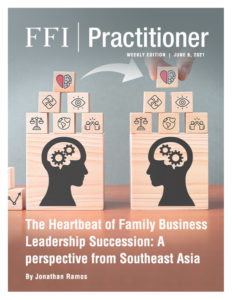
View this edition in our enhanced digital edition format with supporting visual insight and information.
In this week’s edition of FFI Practitioner, Jonathan Ramos explores the unique challenges faced by enterprising families when making the transition from the second to the third generations. Based on Jonathan’s experience advising families in Southeast Asia, he explains the importance of effectively transferring the emotional wealth developed by the previous generations to the third generation.
Generational Difference
Family businesses are not strangers to challenging times. Wars, pandemics, and transitions are but a few of the challenges multi-generational enterprising families have faced.
For some family businesses, a significant milestone occurs when the third generation assumes the helm of the family enterprise. In my experience working with families making the transition to the third generation in Southeast Asia, this succession stage tends to be more challenging than the transition from the first to the second generation. Moreover, with the global pandemic still in play, family businesses already have a lot on their hands and in their minds to deal with.
Even if a family’s transition from the first to the second generation was a relative walk in the park, due to close connections with the founders, the ascendance of the third generation will likely be far more difficult and introduce new obstacles. For example, for many families the socio-economic landscapes and cultural norms have changed significantly for third generation family members, e.g., succeeding generations are educated differently, travel more widely, and appear to be more comfortable operating in the virtual world.
One reason it can be uniquely difficult to prepare the third generation for collaboration in the business is that they likely did not have the second-generation experience of witnessing the founders build the family business. This potentially close intimacy with the founders, as experienced by members of the second generation, can cause them to value the business in a special way. Moreover, as children of the founders, the second-generation siblings usually grow up together and tend to be nurtured and formed in the same family culture.
This may not necessarily be the journey of the third-generation cousins. They most likely grew up in different households, potentially in different cities or even in different countries. While there are some shared values and common family traditions in different branches of the second generation, the third generation will likely have a wider variety of experiences. Through parenthood and the introduction of spouses and in-laws into the family, the second generation will create an evolving family culture. Hence, the cousins will have a more diverse experience and background. Also, the third generation, benefiting from the success of the family business, may live more comfortable and affluent lives than their parents and the founding generation. Accordingly, they may see life and the world differently than the preceding generations, who had to make more sacrifices and take more risks to succeed. For the third generation to work together and collaborate better may require a more conscious and concerted effort to build bonds, trust, healthy communication dynamics, and shared appreciation for the humble beginnings of the family and the family enterprise.
As the generations go further from the founders, there is a risk that important knowledge, values, and mindsets—including those principles that might be the determining factors that made the family business succeed, grow, and last over time—might get watered down. Unknowingly, through generation after generation, a natural erosion can take place. At some point the passion and commitment of the emerging third generation to the business may fade away.
Handing Down the Legacy: Some questions
What are critical areas for handing down the legacy of the founding generation? Knowledge and skills are to be transferred, yes. Preparation in business acumen should be in the mix. Identification and grooming of the next leadership are vital. However, will all these be enough guarantee for family business perpetuation across many generations?
Is family business wealth only about money, finance, and assets? What are other treasures of the family that have an impact on the life and sustainability of the business? How about the values of the founders that were instrumental in building the family business to grow and flourish?
These family values and traditions are components of emotional wealth.1
As the family grows further away in time from the founders’ era, it is important to capture, preserve, nurture, and effectively transfer the emotional wealth. The transition from the second to the third generation is a crucial stage in a family business plan for longevity and multi-generational perpetuation. In my experience working with multigenerational companies in the Philippines, I have observed that families who emphasize passing this emotional wealth to the third generation tend to preserve their connection to the enterprise and have greater multigenerational success than families who only focus on preparing the third generation for the more technical aspects of leadership.
Preparation and Transition of Emotional Leadership
Many of the enterprising families that I work with find themselves at this common stage of transition, and they could benefit from consulting interventions that emphasize the importance of emotional leadership. With more than two generations already engaged in the family business, there will be diverse expectations on the business within the growing number of family members, as well as greater pressure put on the communication dynamics. The next generation family leader(s) should be emotionally prepared to unite different aspirations and expectations of both the family and the business.
To improve their effectiveness, the next set of family business leaders can be equipped with emotional leadership – a trait that leaders can utilize to influence their followers toward a common goal. According to Daniel Goleman, author of Emotional Intelligence, developing emotional intelligence is important to developing emotional leadership, since emotional leadership has a direct correlation with emotional intelligence.2
Emotional intelligence has two facets:
- Personal Competence: knowing and managing oneself (self-awareness, self-regulation, and self-motivation)
- Social Competence: awareness of others’ feelings, needs, and concerns (empathy and social skills)3
These competencies in emotional intelligence will help leaders navigate the ups and downs of running a business, but more importantly they will help leaders to manage their expectations for family members and to sustain stronger family relationships. Strong emotional leadership will prepare family leaders to address inevitable family conflicts more effectively.
Implications for Advisors
From my perspective, there is considerable value in preparing third generation succession to develop emotional wealth and leadership. Here are some implications for advisors:
- Advisors may become more effective in their work by developing their own emotional leadership capacity by growing their emotional intelligence.
- Advisors can benefit from improving their communication skills in order to connect with multiple generations of family businesses.
- Advisors can be instrumental in increasing awareness among family businesses in transition of the presence of emotional wealth.
- Advisors can raise awareness among family members that transition and succession planning are not merely intellectual processes where policies, protocols, and structures are discussed, but also comprise a journey to develop emotional leadership and reach a shared purpose, direction, and future.
- During the consulting process, advisors can advocate the value of patience among all stakeholders involved in the transition and succession planning, since the process might be long and emotional for the family.
Among the many ways advisors can help the family business perpetuate an enterprise’s legacy, emotional preparation of the next generation of family business leaders is a pivotal strategy.
The mind of the leader will bring the family business to new heights, but the heart of the leader can bring the whole family together in unity.
References
1Gómez-Mejía LR, Haynes KT, Núñez-Nickel M, Jacobson KJL, Moyano-Fuentes J. Socioemotional Wealth and Business Risks in Family-controlled Firms: Evidence from Spanish Olive Oil Mills. Administrative Science Quarterly. 2007.
2Goleman, Daniel. 1997. Emotional Intelligence. New York: Bantam Books.
3Ibid.
About the Contributor

Jonathan Ramos, ACFWA, is the founder and CEO of Premier Family Business, where he has led a wide pool of multi-disciplinary consultants in legal, financial, psychology, OD, and management fields for holistic family business coaching and consulting for over a decade. He has served as an independent advisor, facilitator, and consultant to more than 80 family enterprises across multiple industries, and he serves on the FFI Board of Directors. Jon lives in Cebu City in the Philippines and can be reached at [email protected].

View this edition in our enhanced digital edition format with supporting visual insight and information.





